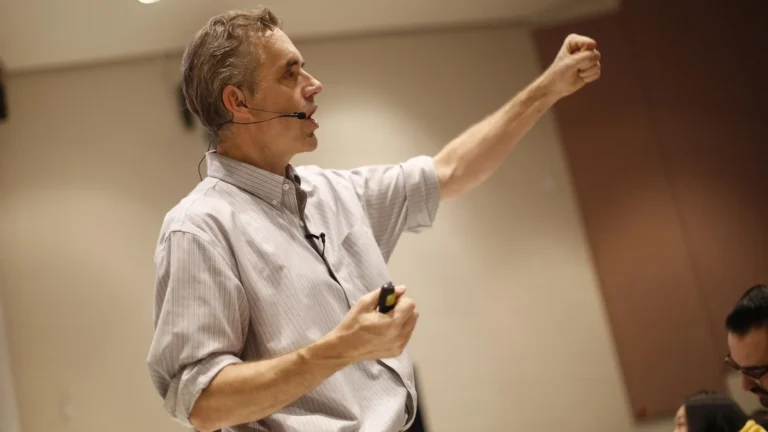Jordan Peterson, a Canadian psychologist and professor, has become a household name over the past few years. His influence has grown exponentially, with people around the world tuning in to hear his thoughts and ideas. But what does Jordan Peterson do? In this comprehensive article, we will delve into his background, professional work, and impact on modern society, focusing on the key phrase “what does Jordan Peterson do.”

A Background on Jordan Peterson
Jordan Peterson was born in 1962 in Alberta, Canada. He studied psychology at the University of Alberta and received his Ph.D. from McGill University in 1991. He later became a professor at Harvard University before returning to Canada to teach at the University of Toronto. Peterson’s academic interests include personality theory, social and abnormal psychology, as well as the psychology of religious and ideological beliefs.
The Rise of Jordan Peterson
Peterson first gained prominence through his YouTube channel, where he posted lectures and discussions on various psychological and philosophical topics. However, it was his opposition to Bill C-16, a Canadian law that added gender identity and expression to the list of prohibited grounds for discrimination, that catapulted him into the public eye. Peterson argued that this legislation would infringe on free speech rights, leading to intense public debate and making him a prominent figure in the free speech movement.
His Books and Lectures
As an accomplished writer, Jordan Peterson has published several books that have gained international recognition. His most famous work, “12 Rules for Life: An Antidote to Chaos,” became a best-seller in multiple countries. This self-help book offers practical advice rooted in psychological principles and draws on Peterson’s expertise in mythology, religion, and literature. Additionally, Peterson’s lectures, available on his YouTube channel, continue to draw in millions of viewers, covering topics such as personal development, cultural criticism, and the importance of mythology.
The Jordan Peterson Phenomenon
With his rise to fame, Jordan Peterson has amassed a large following, inspiring millions around the world. His fans admire his intellectual rigor, thought-provoking ideas, and unapologetic stance on free speech. However, he has also faced criticism from those who perceive his views as controversial or regressive. Some argue that his critiques of political correctness and social justice movements can be polarizing, while others see him as a champion for free thought and individualism.
The Impact of Jordan Peterson's Work
The question, “What does Jordan Peterson do?”, cannot be answered without examining his impact on various aspects of society. His work has influenced numerous areas, including:
Mental Health and Self-Help: Peterson’s psychological insights and practical advice have resonated with many individuals seeking guidance in their personal lives. His emphasis on personal responsibility, self-improvement, and finding meaning in life has inspired countless people to make positive changes.
Free Speech Advocacy: Peterson’s opposition to Bill C-16 and his commitment to open dialogue have made him a leading figure in the free speech movement. He has used his platform to encourage the exchange of ideas and foster intellectual diversity.
Education and Academia: As a professor, Peterson’s lectures have impacted thousands of students, while his YouTube channel has extended his reach to millions more. His focus on critical thinking and intellectual exploration has challenged traditional educational norms and inspired a new generation of thinkers.
Controversies Surrounding Jordan Peterson
As with any influential figure, Jordan Peterson’s work has not been without controversy. Critics argue that some of his views may be perceived as anti-feminist, anti-progressive, or even transphobic. Peterson has consistently defended his positions, maintaining that his critiques are aimed at specific ideologies and not marginalized groups. He has also highlighted the importance of engaging in open dialogue and challenging the status quo in order to foster societal growth.
Upcoming Projects and Future Endeavors
Despite facing various challenges, including a personal health crisis, Jordan Peterson has continued to engage with his audience and produce thought-provoking content. He has released a sequel to his best-selling book, titled “Beyond Order: 12 More Rules for Life,” which delves deeper into the themes of personal growth and societal stability. As he continues to recover and regain his strength, Peterson is expected to resume lecturing and further expand his reach as an influential figure in the world of psychology, philosophy, and public discourse.
Engaging with Jordan Peterson's Work
For those interested in exploring the ideas and teachings of Jordan Peterson, there are several ways to engage with his work:
Books: Start by reading “12 Rules for Life: An Antidote to Chaos” and “Beyond Order: 12 More Rules for Life” to gain a comprehensive understanding of Peterson’s practical advice and philosophical perspectives.
YouTube Channel: Peterson’s YouTube channel offers a wealth of content, including lectures, interviews, and discussions on various topics. This platform allows you to explore his ideas in depth and understand the context behind his viewpoints.
Podcasts and Interviews: Jordan Peterson has appeared on numerous podcasts and radio shows, engaging in stimulating conversations with other thinkers and public figures. These exchanges offer additional insight into his perspectives and provide a broader context for understanding his work.
Live Events: As his health permits, Peterson is known to participate in live events, including lectures, debates, and conferences. Attending these events can provide a unique opportunity to witness his ideas in action and engage with his teachings firsthand.
In Summary
When asking “What does Jordan Peterson do?”, it becomes clear that his impact extends far beyond a simple answer. As a psychologist, professor, author, and influential public figure, Peterson has inspired millions to rethink their lives, challenge societal norms, and engage in open dialogue. His work and ideas continue to resonate with people around the world, making him a crucial figure in today’s intellectual landscape.
